In public statements, First Resources says it is committed to producing the palm oil that ends up in major Western brands’ cosmetics, foods and biofuel in a manner that doesn’t deplete natural resources and protects wildlife and the environment.
But an investigation by nonprofit newsroom The Gecko Project reveals how First Resources’ majority shareholders, the billionaire Fangiono family, have breached their company’s pledge of “sustainable” production by secretly controlling companies that environmental analysts found had cleared large areas of rainforest in Indonesia.
The investigation in collaboration with the International Consortium of Investigative Journalists also spotlights a loophole in the Singapore Exchange’s reporting rules that allows listed companies to publish so-called sustainability reports, without requiring that an independent firm audits the company’s green claims.
The findings are part of Deforestation Inc., a cross-border investigation led by ICIJ that exposed how a lightly regulated sustainability industry overlooks forest destruction and human rights violations when granting environmental certifications. Deforestation Inc. showed how major companies increasingly use certifications based on flawed audits to advertise products and operations as compliant with environmental standards, labor laws and human rights, misinforming shareholders as well as customers.
In a press release, First Resources said that in 2022 it recorded “its best performance” financially since listing on the Singapore exchange with $1.2 billion in revenues. In the sustainability report it published on its website, the company assured investors and customers that its supply chain is “transparent” and that it “encourages” its suppliers to adhere to its environmental standards.
The examination of First Resources’ practices by The Gecko Project appears to contradict the company’s statements.
For years, environmental advocates have suspected that First Resources was linked to three ostensibly independent Indonesia-registered firms that have long been criticized for what researchers described as devastating environmental practices.
Now, The Gecko Project’s investigation uncovers new evidence showing that the Fangiono family in fact quietly controls the three firms that, research reports have found, cleared more forest for palm oil than any other company in Southeast Asia.
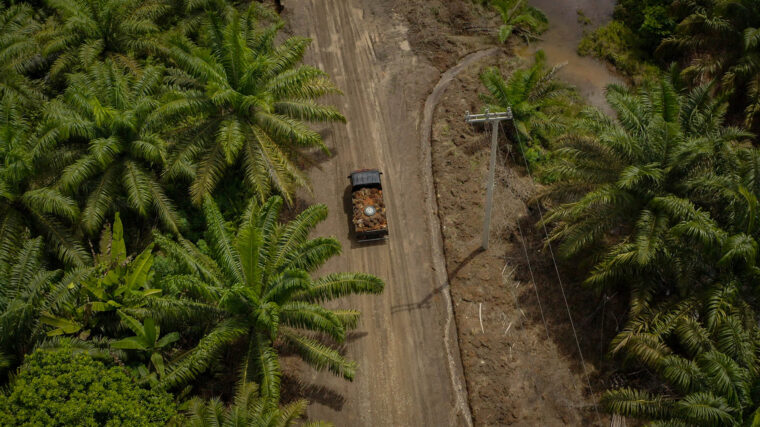
The Gecko Project interviewed 14 former staffers who had been employed either by First Resources or one of the three Indonesian companies — FAP Agri, Ciliandry Anky Abadi (CAA) and New Borneo Agri — between 2011 and 2022. Most of them said that they considered the companies to be part of the same corporate group and didn’t make much distinction between them. Some former employees said they wore First Resources uniforms while working for the other firms and even sang the same company anthem that referred to the “First Resources Group” while en route to plantations or on other occasions. Among the lyrics: “We are the First Resources group, determined to excel in agribusiness. With our loyalty growing, we are proud to be part of you.”
Employees recounted working in a single office to analyze records that came from both First Resources, which claims to provide “sustainable” products, and the other firms that researchers found had been clearing rainforest at the same time. Former workers interviewed over the course of one year said they ultimately reported to Ciliandra and Cik Sigih Fangiono, brothers who serve, respectively, as First Resources chief executive and deputy chief executive. The family’s fortune is estimated at $2.2 billion, according to Forbes magazine.
Based in Singapore, First Resources both produces palm oil on its own Indonesian plantations and buys it from other manufacturers to sell on international markets. FAP Agri is among the company’s suppliers.
I knew from the beginning — it’s all First Resources.
— An anonymous employee
The workers’ accounts support previous findings by Greenpeace and other environmental groups that found in court records and corporate filings that First Resources and the three companies have listed the same office addresses and executives, among other of what Greenpeace calls “numerous connections” between the firms.
One employee who spent several years working for subsidiaries of First Resources and two of the Indonesian companies told The Gecko Project that he regarded doing work for two or three companies at once as “normal.” “I knew from the beginning — it’s all First Resources,” the employee said. “The management is the same, a lot of things are the same. There was nothing strange about it.”
The former employees spoke to The Gecko Project on condition of anonymity. Most of them still work within the palm oil industry — what one worker called “the world of plantations” — and said that revealing their identities could put their livelihoods at risk. They told reporters that they regarded the three companies as “subsidiaries” of First Resources, which one described as the “mother company.”
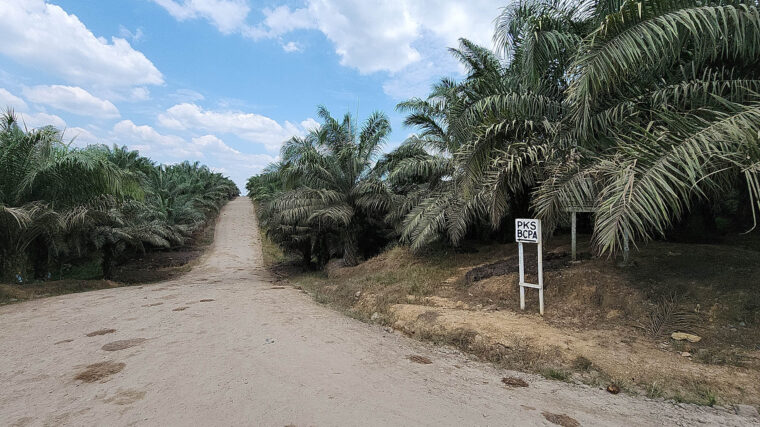
A 2021 annual report filed by FAP Agri after the company was listed on the Indonesia Stock Exchange provides further information suggesting that the company is related to First Resources, according to the researchers. The report says that Wirastuty Fangiono, sister to First Resources CEO Ciliandra Fangiono, is the company’s “ultimate shareholder.” She is also one of the ultimate beneficiaries of a trust that holds shares in First Resources’s holding company, according to a First Resources form filed with the Singapore Stock Exchange.
In response to Süddeutsche Zeitung, an ICIJ partner, a First Resources spokesperson denied that the company was associated with either CAA, New Borneo Agri or FAP Agri, and said the latter has acted only as a supplier “on an ad-hoc basis.”
FAP Agri’s President Director, Ricky Tjandra, told The Gecko Project that First Resources and FAP Agri, a palm oil producer, have no “financial, legal and operational” links. “FAPA is managed independently” and complies with disclosure regulations for companies traded on the Indonesia Stock Exchange, Tjandra said in an email statement.
Neither company addressed questions about Wirastuty Fangiono’s roles as controlling shareholder of FAP Agri and as being among the ultimate beneficiaries of a company that holds First Resources shares.
Ciliandry Anky Abadi and New Borneo Agri did not respond to comment requests from The Gecko Project.
A ‘veneer’ of sustainability
A recent ICIJ review of confidential documents obtained as part of the 2021 Pandora Papers investigation reveals other links between the members of the Fangiono family and FAP Agri. The Pandora Papers are a trove of nearly 12 million files from 14 offshore financial service providers. The files obtained by ICIJ include share certificates, minute meetings and company charts that document the offshore deals of thousands of individuals from more than 200 countries and territories, including powerful business executives and public officials.
According to FAP Agri’s latest financial statements filed with the Indonesia Stock Exchange, the company’s majority shareholder is actually Prinsep Management Ltd., an entity owned by Wirastuty Fangiono.
Pandora Papers records show that Prinsep Management is a British Virgin Islands company that has been part of the broader Fangiono offshore family empire for nearly two decades. A 2006 confidential document states that Ciliandra Fangiono, the First Resources CEO and another sister, Wirasneny Fangiono, were “authorised to act, attend and vote at all General Meetings of Prinsep Management Limited,” FAP Agri’s current majority owner.
According to research by the Forest Peoples Programme, a U.K.-based human rights watchdog, FAP Agri’s subsidiaries were responsible for clearing more than 145,000 acres of forest between 2008 and 2021. The environmental organization has also documented disputes between FAP Agri subsidiaries and indigenous communities in remote parts of Borneo.
After FAP Agri’s disclosure that Wirastuty Fangiono was its ultimate shareholder, Forest Peoples Programme asserted that the two companies “should functionally be considered as one group” and said First Resources bore responsibility for FAP Agri subsidiaries’ actions.
FAP Agri’s “alleged violations suggest that beneath the thin veneer of First Resources sustainable oil palm production lie far more opaque and murkier outfits that are likely in flagrant violation of its’ [no-deforestation] commitments,” Forest Peoples Programme researchers wrote in their 2021 report.
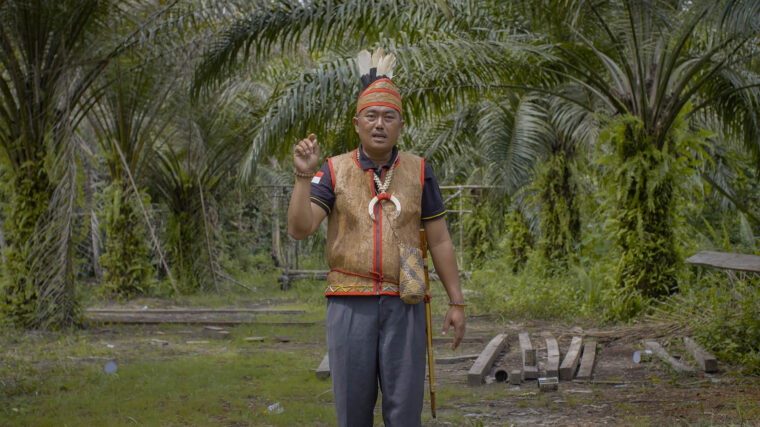
FAP Agri denied violating its environmental commitments. In the statement to The Gecko Project, FAP Agri’s Tjandra said that the company is “committed to sustainable practices” and that it is “well aware of the great responsibility that we carry every year in running our business.” The company did not respond to ICIJ’s questions about the Fangiono family members’ links to Prinsep Management, the BVI-based majority shareholder of FAP Agri.
Unaudited green claims
In 2018, initial reports by Greenpeace that First Resources was linked to suppliers responsible for destroying the rainforest led Unilever, the personal care product giant, to stop buying palm oil from the Singapore company. Last year Belgian food group Vandemoortele also suspended purchases from First Resources, it told ICIJ partners at De Tijd.
First Resources continues to promote its practices as sustainable and its mills continue to supply palm oil to major Western corporations, including Cargill, a U.S. agribusiness conglomerate.
Presented with new evidence showing ties between First Resources and three Indonesian firms, multinational firms Cargill, Vandemoortele, Colgate-Palmolive and Dutch food company Upfield told ICIJ’s media partners that they would investigate the findings of The Gecko Project’s investigation.
All said they rely on the company’s membership in the Roundtable on Sustainable Palm Oil (RSPO), a voluntary certification organization, to assess the sustainability of the company’s operations.
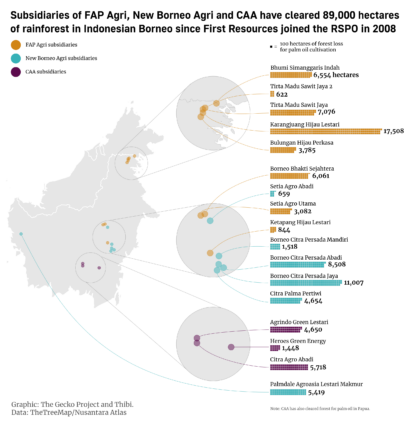
Like other organizations promoting environmentally friendly practices, the RSPO relies on third-party auditing firms to vet clients and certify that palm oil producers and others harvest responsibly and don’t use materials linked to illegal logging and other environmental crimes.
However, ICIJ’s Deforestation Inc. investigation found that, with alarming frequency, auditors who certify companies for organizations such as the RSPO validate products linked to deforestation and other harmful practices.
In 2021, an anonymous party filed a complaint with the RSPO against First Resources asserting that the Singapore company had “ownership, control and influence” over FAP Agri and Ciliandry Anky Abadi, and that both palm oil producers are responsible for deforestation, peatland degradation and violating indigenous rights. The complaint is publicly available on the RSPO website.
More than two years later, the complaint is still being reviewed, a RSPO spokesperson told ICIJ media partners at The Gecko Project. “These are complex allegations which need careful determination,” the spokesperson said.
First Resources’ sustainability report, produced in compliance with Singapore Exchange rules, makes no mention of FAP Agri. And while the report states that “all data presented within this report has been rigorously reviewed,” it acknowledges that the report was not assessed by an independent third party.
Last year, Singapore Exchange began requiring all listed companies to prepare yearly reports that document their sustainability practices on a “comply or explain” basis. If the listed company decides not to include any of six “primary components” on how it manages climate-related risk or how its operations impact the environment, it has to provide a reason for its decision not to do so. The rule requires that the report be subject to an “internal review” but does not mandate third-party auditing.
A recent study by EY and CPA Australia found that, last year, only 10% of the 240 Singapore-listed companies that disclosed climate risks had had their reports independently audited, highlighting the weakness of the current rules.
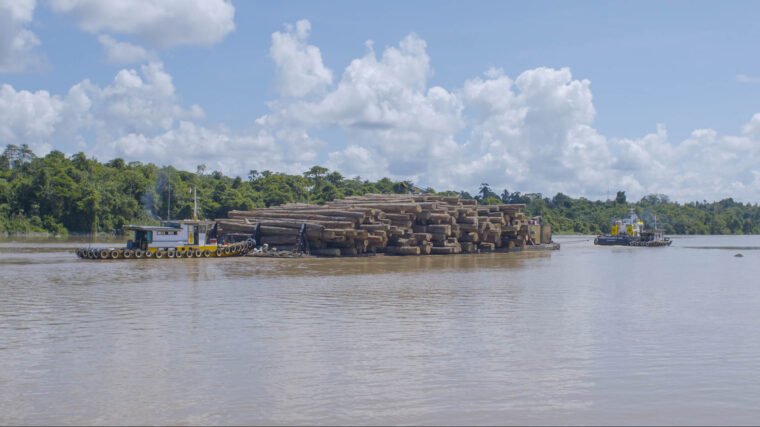
Joseph Chun, an environmental lawyer in Singapore, said the Singapore Stock Exchange is currently considering stricter auditing requirements for sustainability reports but added that, similarly to other jurisdictions, any new requirements will likely not be as strict as those for company financial statements.
“[E]ven with limited external assurance, shareholders and customers would still want to consider whether to do their own due diligence and not be overly reliant on the report or assurance,” Chun told ICIJ.
Singapore Exchange didn’t address ICIJ’s questions about its reporting rules or other topics. Instead, the exchange’s spokesperson sent ICIJ First Resources’ past “clarification statements” saying that First Resources doesn’t own, and isn’t associated with, either FAP Agri or CAA.
The founder’s shell games
Previous investigations by ICIJ and its media partners, as well as reports by international environmental watchdogs, have documented how some major players in the natural resources industry use entities incorporated in secrecy jurisdictions to circumvent the restrictions imposed by their own sustainability policies and conceal their links to deforesters.
According to The Gecko Project, the Fangionos’ use of secrecy jurisdictions to carry out their business activities is part of a pattern in the Indonesian oil palm plantation and forestry sectors.
The Fangiono siblings took First Resources public in 2007, reconstituting the forestry business of their father, Martias Fangiono, which had long been plagued by scandal.
That same year, an Indonesian court found Martias (who goes by his first name) guilty of violating Indonesia’s anti-corruption law by conspiring with local East Kalimantan officials to obtain logging permits later found to have been issued illegally. He was sentenced to one and a half years in prison and ordered to pay a $38 million fine, the amount of funds the state said it had lost due to illegal logging.
As part of the permitting scheme, the elder Fangiono had used a web of companies with different shareholders, making it difficult for investigators to point to him as the ultimate owner, The Gecko Project reported. First Resources was not a party in the legal case.
Leaked Pandora Papers documents from Singapore financial service provider Asiaciti show that, as his legal case progressed, Martias became the shareholder of two shell companies incorporated in Labuan, a territory of Malaysia that at the time had some of the world’s strictest secrecy laws. According to the leaked records, both entities, Borneo Agrindo Ltd. and Asia Green Land Ltd., were exempt from taxes and to be used as investment holdings. Martias continued to be a director of the shell companies even after his conviction, while Indonesia’s anti-corruption agency looked for properties that it could seize and auction off to recoup Martias’ enormous unpaid fines. He later paid the fine in cash, according to the Forest Peoples Programme report.
Martias did not respond to The Gecko Project’s hand-delivered letter seeking comments. ICIJ was unable to reach him directly.
Contributors: Tom Walker and Tomasz Johnson (The Gecko Project)










